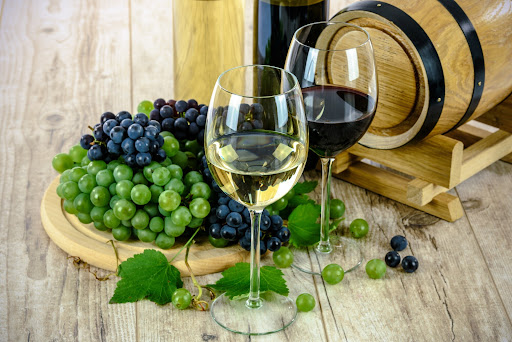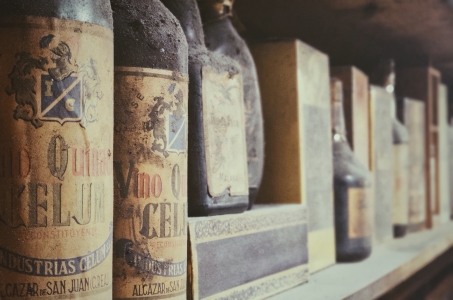What Is Fine Wine: The Ultimate Guide on Fine Wine
Whether a wine is fine or not often lies in the eyes of the beholder. Or, more aptly: it lies in the palate of the sipper. Some critics have suggested there is no single method for determining if a specific wine is fine, while others stick to rigid systems to form their opinions.
Fine wine is more of a subjective concept than an objective one at the end of the day. That said, there are specific criteria that we can look for to generally distinguish fine wine from table wine or mass-produced wine. Among other characteristics, fine wine is typically higher-quality and more expensive.
If you want to learn more about fine wine and how you can tell it apart from other types of wine, you've come to the right place. Here is Vint's ultimate guide on fine wine!
What Does "Fine Wine" Mean?
Each country has its legal requirements for what wine producers must put on their labels. But there is not a legal definition of fine wine. It is essentially a term used for marketing; however, some characteristics are widely recognized to distinguish fine wine from its mass-produced and table counterparts.
In most cases, the wine producer is one of the best globally, and the winery produces a consistent flow of exquisite wines. For example, most fine wines consist of the highest-grade grapes grown in pristine conditions. It is also essential that the vineyard and region are critically acclaimed and renowned for high-quality wines.
When researching fine wine (or shopping for it in specialty stores), you may notice some of these other terms from around the world:
- Reserva/Riserva
- Premier Cru / 1er
- Grand Cru
- Denominazione di Origine Controllata / Denominazione di Origine Controllata e Garantita
- Reserve
- Denominación de Origen (DO)
- Prestige Cuvée or Special Cuvée
- Classified Growth
- Premier Grand Cru Classé
- Superiore
Common Criteria for Fine Wine
Though determining whether a wine is fine can be heavily subjective, there are specific boxes that a wine must check off before it can be called "fine." Let's take a look at some of the most criteria:
Quality
As with defining fine wine itself, the concept of quality is entirely subjective. Most people who drink wine are not sommeliers, and they do not have the expertise or palate to distinguish between the finest of wines. For instance, one person may consider a $9 bottle of "entry-level" Bordeaux delicious while the next person can barely stomach it.
As such, the wine industry relies on critics to decide which wines are exquisite, above-average, acceptable, poor, and so forth. One thing is sure: All fine wines are incredibly balanced, lengthy, and complex. If you don't know what those terms mean about wine, don't worry! That knowledge will come as you taste more varieties.
Winemaker's Reputation
Another factor to consider with fine wines is that the estate or winemaker must have a stellar track record in producing top-tier wines. Of course, other factors can determine an estate's reputation. For example, if a specific estate makes a lot of wine, it can harm its reputation in the fine wine community because it can lower collectibility. Much of an estate's reputation also hinges on its marketing success.
That said, fine wine lovers generally revere estates that have long been producing exceptional wine above those that have not been in the game as long. And the longer a winery or winemaker has been in business; the more refined their craftsmanship and processes are likely to be.
It's important to note that there are exceptions, especially when it comes to New World wines. There are relatively new wineries producing fine wines and centuries-old estates that have yet to break into the fine wine category.
Region
Until recent decades, wines originating from Old World wine regions ruled the industry. Now, numerous New World wines are becoming more popular and critically acclaimed, which means that you can no longer base a wine's potential to be fine solely on its origin. As one example, the Cult Cabs of Napa Valley have quickly become some of the world's most sought-after wines.
Another thing to consider is that most fine wines come from a reasonably small, well-defined source of grapes. In other words, the quality of fine wine is often influenced by the regional spread of its vines. This is why you see single-vineyard premier crus wine marketed as such.
Nonetheless, New World wines usually contradict that logic and many other traditional winemaking boundaries. Penfold's Grange is widely considered one of the best Australian wines. And it has always blended at least two South Australian wine regions; these regions are often hundreds of miles apart. Not surprisingly, some winemakers from the classical fine wine regions in Europe would be disturbed by this concept.
Impact of Aging
Mass-produced and table wines will not improve with age. In fact, they will not age at all in the bottle. On the other hand, fine wines are traditionally aged in wood before bottling, although that is becoming less critical for determining the potential for a fine wine designation. The most important characteristic is the wine's ability to age in the bottle.
Rarity and Cost
Finally, fine wine production is often limited because of the quality of materials, the craftsmanship, and the winemaker reputation involved. Fine wine is known for its rarity compared to the countless bulk wines you will find at the grocery store. Most fine wine estates only produce vintage bottles by the thousands instead of millions. In some cases, there will only be hundreds of bottles of fine wine available.
Falling in line with the fundamental supply-and-demand principles, a wine in increasingly short supply will often be sought after. This means that you can usually sell the wine at a higher price. Going further, the cost itself is another hallmark of fine wine. This is due to the fact that it costs more for wineries to produce and age fine wines compared to mass produced. You can rarely find fine wines for under $15.
Fine Wine Corks and Bottles
As you begin to research fine wines, you will notice that most are sold in amber-colored or green bottles to protect them from light when in storage. A wine's type and region will determine the bottle shape, and most fine wines come with either a synthetic or natural cork.
Because natural cork can sometimes spoil the wine, many winemakers are beginning to use screw caps.
Fine Wine Storing and Aging
Most fine wines allow several years' aging under controlled humidity and temperature. And their flavors typically flourish over time. That said, it's critical to research each wine to figure out how long you should age them. You don't want to over-age your wine just as you don't want to drink it before it is ready.
Always store your bottles of fine wine in a climate-controlled location. 60% to 65% humidity and 55 degrees Fahrenheit are ideal for most wines. Make sure no vibration or light can impact your stored wine, and refer to a wine temperature chart to ensure that you serve your wine at the precise temperature that gives you the full potential of aroma and flavor.
"Wining" Down
Much of determining whether a wine is fine comes down to subjective opinion. However, every fine wine in the world is widely considered to excel in quality, age-worthiness, scarcity, and other characteristics.
Consider the information and advice above as you seek more knowledge about fine wine, and remember to explore platforms like Vint for getting a headstart on your fine wine investments. We take the complications out of your investment and pave the way for building wealth!
Sources:
The Enthusiast 100: The Best Wines of 2021 | WineEnthusiast
Aging Wine: How Can You Tell If a Cabernet Is Worth Cellaring? | Robb Report


